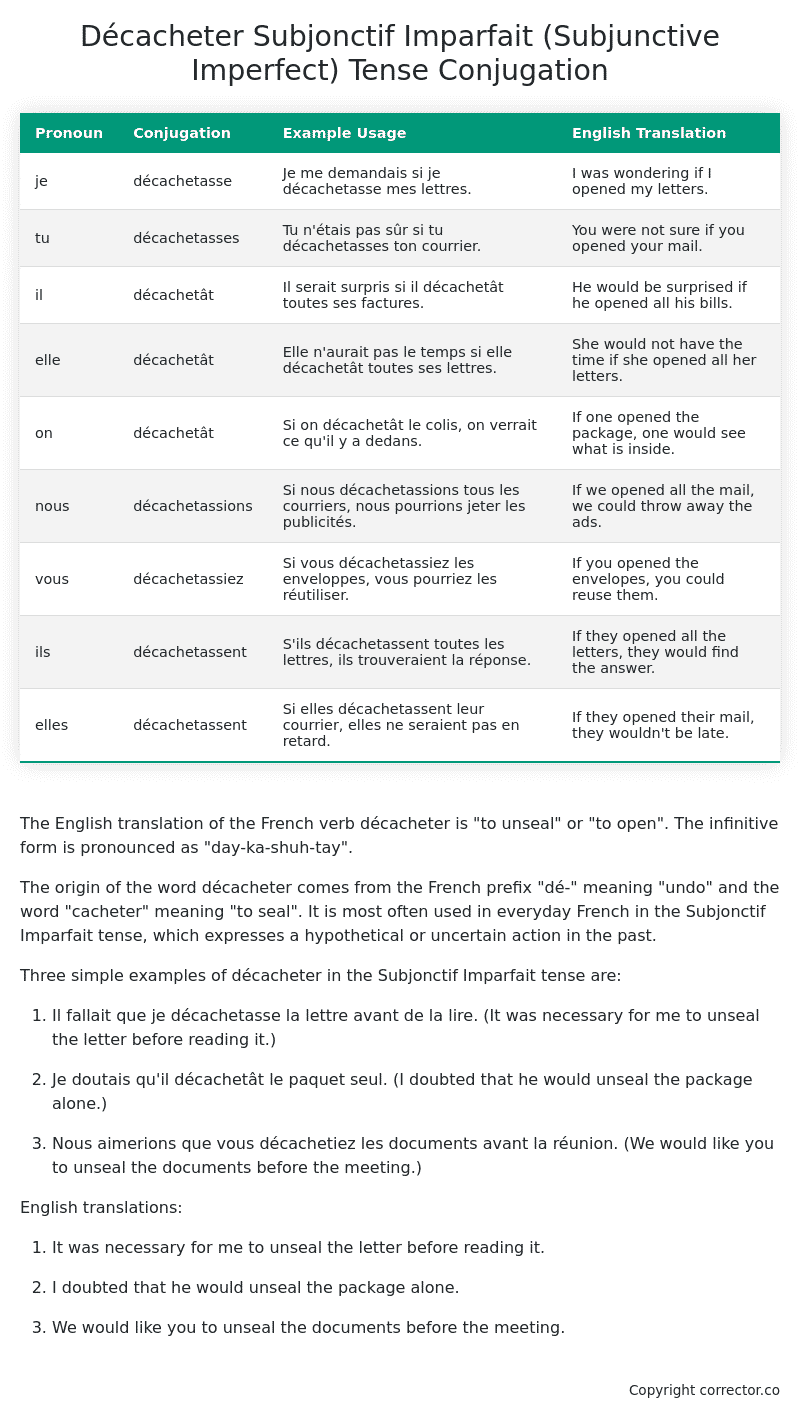Subjonctif Imparfait (Subjunctive Imperfect) Tense Conjugation of the French Verb décacheter
Introduction to the verb décacheter
The English translation of the French verb décacheter is “to unseal” or “to open”. The infinitive form is pronounced as “day-ka-shuh-tay”.
The origin of the word décacheter comes from the French prefix “dé-” meaning “undo” and the word “cacheter” meaning “to seal”. It is most often used in everyday French in the Subjonctif Imparfait tense, which expresses a hypothetical or uncertain action in the past.
Three simple examples of décacheter in the Subjonctif Imparfait tense are:
-
Il fallait que je décachetasse la lettre avant de la lire. (It was necessary for me to unseal the letter before reading it.)
-
Je doutais qu’il décachetât le paquet seul. (I doubted that he would unseal the package alone.)
-
Nous aimerions que vous décachetiez les documents avant la réunion. (We would like you to unseal the documents before the meeting.)
English translations:
-
It was necessary for me to unseal the letter before reading it.
-
I doubted that he would unseal the package alone.
-
We would like you to unseal the documents before the meeting.
Table of the Subjonctif Imparfait (Subjunctive Imperfect) Tense Conjugation of décacheter
| Pronoun | Conjugation | Example Usage | English Translation |
|---|---|---|---|
| je | décachetasse | Je me demandais si je décachetasse mes lettres. | I was wondering if I opened my letters. |
| tu | décachetasses | Tu n’étais pas sûr si tu décachetasses ton courrier. | You were not sure if you opened your mail. |
| il | décachetât | Il serait surpris si il décachetât toutes ses factures. | He would be surprised if he opened all his bills. |
| elle | décachetât | Elle n’aurait pas le temps si elle décachetât toutes ses lettres. | She would not have the time if she opened all her letters. |
| on | décachetât | Si on décachetât le colis, on verrait ce qu’il y a dedans. | If one opened the package, one would see what is inside. |
| nous | décachetassions | Si nous décachetassions tous les courriers, nous pourrions jeter les publicités. | If we opened all the mail, we could throw away the ads. |
| vous | décachetassiez | Si vous décachetassiez les enveloppes, vous pourriez les réutiliser. | If you opened the envelopes, you could reuse them. |
| ils | décachetassent | S’ils décachetassent toutes les lettres, ils trouveraient la réponse. | If they opened all the letters, they would find the answer. |
| elles | décachetassent | Si elles décachetassent leur courrier, elles ne seraient pas en retard. | If they opened their mail, they wouldn’t be late. |
Other Conjugations for Décacheter.
Le Present (Present Tense) Conjugation of the French Verb décacheter
Imparfait (Imperfect) Tense Conjugation of the French Verb décacheter
Passé Simple (Simple Past) Tense Conjugation of the French Verb décacheter
Passé Composé (Present Perfect) Tense Conjugation of the French Verb décacheter
Futur Simple (Simple Future) Tense Conjugation of the French Verb décacheter
Futur Proche (Near Future) Tense Conjugation of the French Verb décacheter
Plus-que-parfait (Pluperfect) Tense Conjugation of the French Verb décacheter
Passé Antérieur (Past Anterior) Tense Conjugation of the French Verb décacheter
Futur Antérieur (Future Anterior) Tense Conjugation of the French Verb décacheter
Subjonctif Présent (Subjunctive Present) Tense Conjugation of the French Verb décacheter
Subjonctif Passé (Subjunctive Past) Tense Conjugation of the French Verb décacheter
Subjonctif Imparfait (Subjunctive Imperfect) Tense Conjugation of the French Verb décacheter (this article)
Subjonctif Plus-que-parfait (Subjunctive Pluperfect) Tense Conjugation of the French Verb décacheter
Conditionnel Présent (Conditional Present) Tense Conjugation of the French Verb décacheter
Conditionnel Passé (Conditional Past) Tense Conjugation of the French Verb décacheter
L’impératif Présent (Imperative Present) Tense Conjugation of the French Verb décacheter
L’infinitif Présent (Infinitive Present) Tense Conjugation of the French Verb décacheter
Struggling with French verbs or the language in general? Why not use our free French Grammar Checker – no registration required!
Get a FREE Download Study Sheet of this Conjugation 🔥
Simply right click the image below, click “save image” and get your free reference for the décacheter Subjonctif Imparfait tense conjugation!

Décacheter – About the French Subjonctif Imparfait (Subjunctive Imperfect) Tense
Formation
Common Everyday Usage Patterns
Interactions with Other Tenses
Subjonctif Présent
Indicatif Passé Composé
Conditional
Conditional Perfect
Summary
I hope you enjoyed this article on the verb décacheter. Still in a learning mood? Check out another TOTALLY random French verb conjugation!


